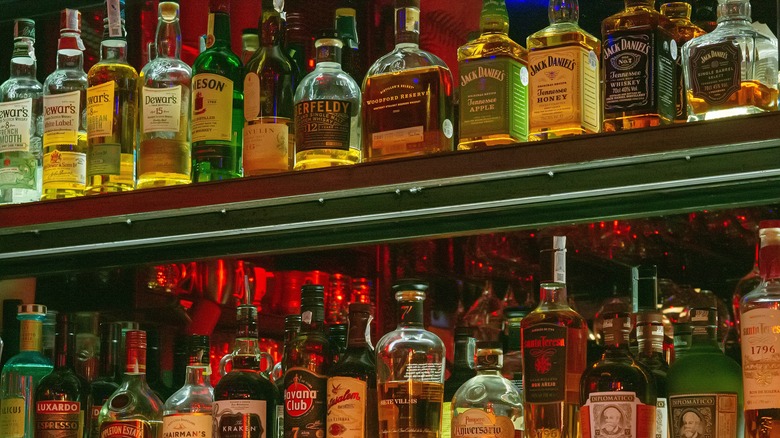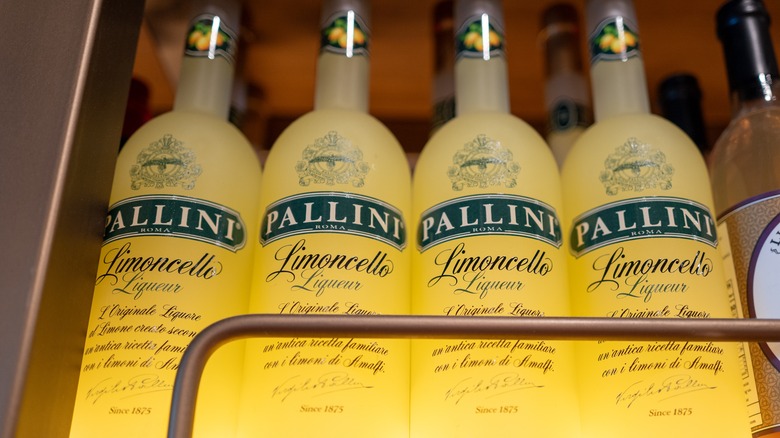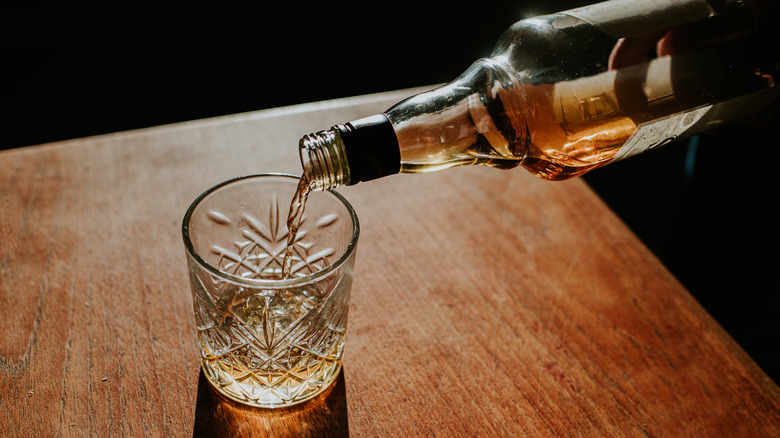Does Liquor Actually Expire?
Many people have some kind of liquor in their homes, but more often than not, bottles find themselves pushed to the back of the cabinet and forgotten about for months if not years. If you're side-eyeing your liquor cabinet right now, you're not alone. The good news is that many types of liquor are incredibly shelf-stable and can last indefinitely, open or unopened, if appropriately stored in a cool, dark place.
Hard liquors like whiskey, brandy, gin, vodka, soju, tequila, mezcal, rum — basically anything with an alcohol content above 30%— can last for a lifetime, even after opening. However, they can also lose their smoothness and pick up a harsher burn. The reason why liquors are so shelf stable comes down to their alcohol content. Because high alcohol levels are toxic, bacteria and even brewing yeasts can't tolerate levels over 20%. Once you get above this point, literally nothing can grow inside the liquid, so the only types of degradation that can occur are related to oxygen and heat.
While it's recommended to consume opened distilled liquor within one to three years, it won't get to a point where it's dangerous to consume, no matter how long it sits. That said, if you have a discerning palate, you'll notice a change in flavor and aroma over time. Vodka is the least likely to experience degradation due to its simplicity, but whiskies, like bourbons and scotches, can lose their delicate flavors in as little as six months. Likewise, tequila, rum, and gin can begin tasting different within a year.
Unlike pure liquor, liqueurs won't last forever
Liqueurs, also known as cordials, are a bit different to pure distilled liquors because they usually include sugars and other additives. While sugar is great for warding off bacteria and other microbes, it can also crystalize or turn into a syrupy mess if left alone for too long and badly stored. Most liqueurs should be consumed within six months to a year after opening to preserve flavor and prevent oxidation. That said, certain liqueurs can age differently than others. Vermouth, for instance, should be stored in the refrigerator when opened and will last about two months. Meanwhile, berry liqueurs and citrus liqueurs, like Cointreau or Grand Marnier, have longer shelf lives and can last for about two years when stored in a cool, dry place.
As a rule, liqueurs that contain more sugar will degrade faster, though higher proofs or preservatives can combat spoilage for a bit. Any that include dairy ingredients like Baileys, should drunk quickly; these are often some of the few liqueurs with an expiration date on the bottle. To make sure Irish cream liqueurs stay delicious, they should be stored in the fridge once opened and consumed within six months. If you notice any curdling, discoloration, or crystallization in your liqueurs, they should be thrown out.
How to store liquor to prolong its life
While hard liquor is practically immortal, that doesn't mean you shouldn't take care with how you store it. Oxygen can significantly impact open bottles, changing the composition of a spirit and altering its taste, while the ethanol can evaporate over time, lowering the proof. For this reason, it's essential to ensure your bottles are sealed tightly. Don't leave speed pourers on them, as they make it easier for air to enter.
Like beer bottles, liquor bottles should be kept out of the light and in a dark, cool place. Light and heat can speed up evaporation, and with liquors like gin, light, in particular, can polymerize terpenes and oils from botanical ingredients. Additionally, heat can cause liquors to expand, which could result in the cork being forced out.
Moreover, unlike wine, liquor should always be stored upright and not on its side. Hard liquor can erode the cork over time, and this is a common storage mistake that can ruin a good whiskey by allowing air in and increasing evaporation. While this is not an issue with screw-top bottles, upright storage can also prevent leaking if the cap isn't tight enough.


